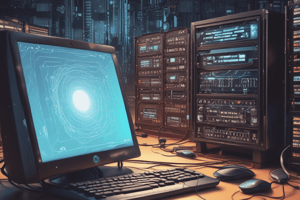Podcast
Questions and Answers
What is the primary function of the process management module?
What is the primary function of the process management module?
- Managing memory allocation to programs
- Managing file organization and storage
- Tracking and allocating devices
- Providing mechanisms for synchronization and communication among processes (correct)
What is the purpose of the I/O controller?
What is the purpose of the I/O controller?
- To track and allocate devices (correct)
- To manage file organization and storage
- To manage memory allocation
- To interpret commands given by the user
What type of system is a group of processors that do not share memory, hardware devices, or a clock?
What type of system is a group of processors that do not share memory, hardware devices, or a clock?
- Networked system
- Centralized system
- Parallel processing system
- Distributed system (correct)
What is the primary function of the file management module?
What is the primary function of the file management module?
What is the primary function of the security module?
What is the primary function of the security module?
What is the primary function of the command interpretation module?
What is the primary function of the command interpretation module?
Flashcards are hidden until you start studying
Study Notes
Process Management
- Creates and deletes processes
- Provides mechanisms for synchronization and communication among processes
Memory Management
- Allocates and deallocates memory space to programs
- Manages memory resources for running programs
Storage Management
- Manages primary storage, secondary storage, and cache storage
- Ensures instructions and data are stored in primary storage or cache for running programs
Device Management
- Keeps track of all devices
- Allocates and deallocates devices
- Performs tasks through the I/O controller
I/O System Management
- Manages communication between user and device drivers
- One of the main objectives of an Operating System (OS)
File Management
- Manages file-related activities
- Includes organization, storage, retrieval, naming, sharing, and protection of files
Security
- Protects data and information from malware threats and unauthorized access
Command Interpretation
- Interprets commands given by the user
- Acts on system resources to process commands
Networking
- Enables communication among processors in a distributed system
- Processors do not share memory, hardware devices, or a clock
Job Accounting
- Keeps track of time and resources used by various jobs and users
Communication Management
- Coordinates and assigns software resources (compilers, interpreters, etc.) to various users of the computer system
Studying That Suits You
Use AI to generate personalized quizzes and flashcards to suit your learning preferences.




